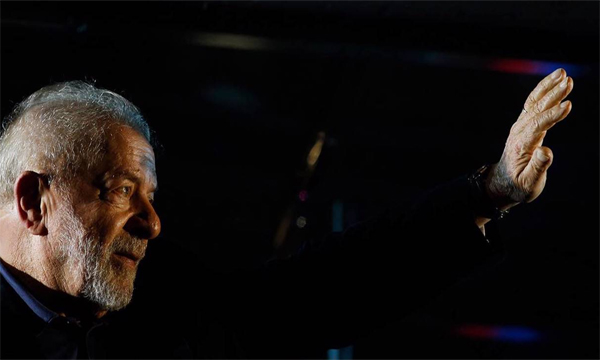Camila Villard Durand cautions jubilant Brazilians that the forces that backed the defeated far-right president remain powerful.

Por Camila Villard Durand
SAN PAULO – Brasil ha elegido un nuevo presidente eligiendo un viejo presidente. Luiz Inácio Lula da Silva del Partido de los Trabajadores, que ejerció la presidencia desde 2003 hasta 2010, derrotó al actual presidente de extrema derecha, Jair Bolsonaro, en la segunda vuelta. Pero eso no significa que lo que representaba Bolsonaro haya sido derrotado.
The mere fact that there was a runoff underscores the fact that Brazil’s electorate, like many around the world, is deeply polarized. Bolsonaro, whose appeal is particularly strong among the military and conservative Christians, received more than 51 million votes in the first round, and more than 58 million in the second. He also receives considerable behind-the-scenes support – financial and ideological – from powerful economic interests, especially agribusinesses. In fact, agribusiness accounted for 33 of the 50 largest donors to Bolsonaro’s campaign.
Agribusiness is a highly industrialized sector in Brazil, responsible for more than one-quarter of GDP and 48.3% of total exports in the first half of 2022. And its geographical reach is vast, covering much of the north above São Paulo; a significant swath of the southern states; two powerful Central-West states, Mato Grosso and Mato Grosso do Sul; and Roraima in the north. Most of the income gains in Brazil during Bolsonaro’s presidency went to these regions, as the agricultural sector benefited from a devalued national currency and high international commodity prices.
The rest of Brazil was not so lucky. High inflation – consumer prices rose by 8.3% in 2021 – has put severe strain on a large share of the population, with more than half of Brazilians (125.2 million people) living with some kind of insecurity and 15% of the population (33 million people) facing severe food insecurity. In a country that touts its status as the “world’s barn,” this is a sad irony.
Not surprisingly, regions dominated by agribusiness were more likely to support Bolsonaro than Lula. But the president is just one part of the political puzzle. Even without Bolsonaro in power, agribusiness enjoys extensive legislative representation. In 2021, members of the Parliamentary Agricultural Front (FPA) – Brazil’s powerful “rural bench” – comprised 46% of Brazil’s Chamber of Deputies and 48% of the Senate. The Instituto Pensar Agropecuária, which includes 48 entities in the agricultural sector, advises the FPA.
The political machine that agribusiness has built in Brazil has proved highly effective. Under both Bolsonaro and his predecessor, Michel Temer, the FPA promoted, in an organized and systematic way, its interests, especially by contesting indigenous territorial rights in order to legitimize the use of native lands for agricultural production. The FPA also helped to articulate proposals and amendments on a range of regulatory issues, including workers’ rights, environmental licensing, regularization of land tenure, and pesticides.
Further illustrating the farm lobby’s influence, Tereza Cristina, a former FPA president, was nominated to head Bolsonaro’s Ministry of Agriculture in 2019. On October 2, in the first round of this year’s national elections, Cristina – also known as “Mrs. Deforestation” and the “muse of poison” – was elected Mato Grosso do Sul’s senator, winning more than 60% of the vote.
Cristina was not alone. A whopping 70% of the FPA’s representatives in the Chamber of Deputies were re-elected. The organization expects to hold at least 40 of the 81 seats in the Senate in 2023, and even projects new “memberships,” which could bring the total to 45.
Brazil’s Congress will also include Bolsonaro’s former environment minister, Ricardo Salles. In 2018, Salles was convicted in court of the first instance of “administrative impropriety” while heading a São Paulo state environmental agency. Yet he became environment minister a month later, and presided over a surge in deforestation in the Amazon rainforest and major cuts to environmental-protection programs, before being forced to resign last year over allegations of involvement in a timber-trafficking scheme.
The agricultural sector’s political influence thus matches its oft-professed status as a “pillar of the economy.” But there is also an important social and cultural component to its influence. For much of the population, rural life is a kind of national identity, embodied by the romantic image of the “sertanejo,” or countryman.
From rodeos and “vaquejadas” (a sport involving two cowboys on horseback driving a bull into a goal) to country music and festivals, rural cultural traditions are as popular in some areas as soccer and carnival. Agribusiness uses such activities as opportunities to advance the narrative that it is central to Brazilian identity. It is no coincidence that many of Brazil’s leading country singers publicly backed Bolsonaro.
So, Bolsonarism has the economic, political, and cultural influence to outlive Bolsonaro. In many ways, agribusiness – and the FPA, in particular – will make or break Lula’s presidency, particularly when it comes to environmental policy, land-tenure regularization, and the defense of indigenous and quilombolas’ rights. If the agents of Bolsonarism gain even more influence in the midterm local elections in two years, the challenge for Lula will grow even larger.
Bolsonaro’s defeat merits celebration. But no one – least of all Lula – should forget that the forces that empowered him have not gone away.
____________________________________________________________
Camila Villard Duran is an associate professor of law at ESSCA School of Management. Los puntos de vista expresados no necesariamente son los de EnergiesNet.com.
Nota del Editor: Este artículo fue originalmente publicado en Project Syndicate (PS) el 31 de Octubre, 2022. Reproducimos el mismo en beneficio de los lectores. EnergiesNet.com no se hace responsable por los juicios de valor emitidos por sus colaboradores y columnistas de opinión y análisis.
Aviso de uso: Este sitio contiene material protegido por derechos de autor cuyo uso no siempre ha sido específicamente autorizado por el propietario de los derechos. Ponemos a disposición dicho material en nuestro esfuerzo por avanzar en la comprensión de cuestiones de importancia social, medioambiental y humanitaria. Creemos que esto constituye un «uso justo» de dicho material protegido por derechos de autor, tal y como se establece en la sección 107 de la Ley de Derechos de Autor de los Estados Unidos. De acuerdo con el Título 17 U.S.C. Sección 107. Para más información, visite: http://www.law.cornell.edu/uscode/17/107.shtml
EnergiesNet.com alienta a las personas a reproducir, reimprimir, y divulgar a través de los medios audiovisuales e Internet, los comentarios editoriales y de opinión de Petroleumworld, siempre y cuando esa reproducción identifique, a el autor, y la fuente original, http://www.petroleumworld.com y se haga dentro de el uso normal (fair use) de la doctrina de la sección 107 de la Ley de derechos de autor de los Estados Unidos de Norteamérica (US Copyright).
EnergiesNet.com 07 11 2022



